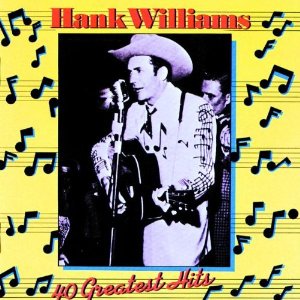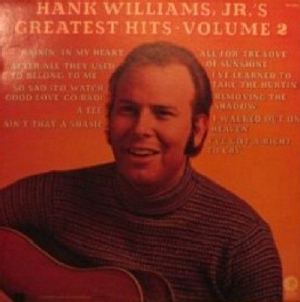
Hiram "Hank" Williams was an American singer-songwriter. He is regarded as one of the most significant and influential American singers and songwriters of the 20th century. Williams recorded 55 singles that reached the top 10 of the Billboard Country & Western Best Sellers chart, five of which were released posthumously, and 12 of which reached No.1.

Randall Hank Williams, known professionally as Hank Williams Jr. or Bocephus, is an American singer-songwriter and musician. His musical style has been described as a blend of rock, blues, and country. He is the son of country musician Hank Williams and the father of musicians Holly Williams and Hank Williams III, and the grandfather of Coleman Williams. He is also the half brother of Jett Williams.

George Glenn Jones was an American country musician, singer, and songwriter. He achieved international fame for a long list of hit records, and is well known for his distinctive voice and phrasing. For the last two decades of his life, Jones was frequently referred to as "the greatest living country singer", "The Rolls-Royce of Country Music", and had more than 160 chart singles to his name from 1955 until his death in 2013.

"Your Cheatin' Heart" is a song written and recorded by country music singer-songwriter Hank Williams in 1952. It is regarded as one of country's most important standards. Williams was inspired to write the song while driving with his fiancée from Nashville, Tennessee, to Shreveport, Louisiana. After describing his first wife Audrey Sheppard as a "cheatin' heart", in minutes he dictated the lyrics to Billie Jean Jones. Produced by Fred Rose, Williams recorded the song at his last session at Castle Studio in Nashville, Tennessee, on September 23.

40 Greatest Hits is a two-record greatest hits compilation by American singer-songwriter Hank Williams. It was released in 1978 by Mercury Records – who under PolyGram became responsible for the MGM tape vault – on the 25th anniversary of Williams' death. Significantly, it was the first anthology in quite some time that did not subject Williams' recordings to either rechanneled stereo, posthumous overdubs, artificial duets with family members, or most or all of the above. Because of both this, and the value-for-money attraction of having a deeper song selection than single-disc compilations issued previously by MGM Records, many reviewers consider this anthology to be the perfect starting point for newcomers to Williams' recorded legacy. The album remains, to this day, the best-selling record of Williams' career.

"Hey, Good Lookin'" is a 1951 song written and recorded by Hank Williams, and his version was inducted into the Grammy Hall of Fame in 2001. In 2003, CMT voted the Hank Williams version No. 19 on CMT's 100 Greatest Songs of Country Music. Since its original 1951 recording it has been covered by a variety of artists.

Waylon and Company is an album by American country music artist Waylon Jennings, released on RCA Records in 1983.
"Ramblin' Man" is a song written in 1951 by Hank Williams. It was released as the B-side to the 1953 number one hit "Take These Chains from My Heart", as well as to the 1976 re-release of "Why Don't You Love Me". It is also included on the 40 Greatest Hits, a staple of his CD re-released material.

My Favorites of Hank Williams is an album by American country music artist George Jones. It was released in 1962 on the United Artists record label. It was Jones' second tribute to the music of Hank Williams.

Grand Ole Opry's New Star is the debut studio album released by George Jones in November 1956 with Starday Records. Produced by Jones' manager Pappy Daily, the album was recorded during early sessions in 1954, throughout 1955, and other sessions in 1956. It is also the first album to be released on the Starday label, a label only four years old.

Songs My Father Left Me is the eleventh studio album by American musician Hank Williams Jr. The full title is Songs My Father Left Me The Poetry of Hank Williams, set to music and sung by Hank Williams Jr. The album was issued in 1969 by MGM Records as number SE 4621.

Hank Williams Jr.'s Greatest Hits – Volume 2 is an album by American country music singer and songwriter Hank Williams Jr. The Album was issued by MGM Records as number SE 4822.

Hank Williams Jr. Fourteen Greatest Hits is an album by American singer and songwriter Hank Williams Jr. The album was issued by Polydor Records as number MG-1-5020.

Anthology, also known as Anthology: The Best of The Supremes, first released in May 1974, is a series of same or similarly titled compilation albums by The Supremes. Motown released revised versions in 1986, 1995 and 2001. In its initial version, a 35-track triple record collection of hits and rare material, the album charted at No. 24 on Billboard's "Black Albums" and No. 66 on "Pop Albums".

The discography of all albums and singles released by Hank Williams Jr. consists of 56 studio albums and 25 compilation albums. He has released 109 singles and 24 music videos. Eleven of his singles have reached Number One in either the United States or Canada.

Hank Williams' discography is composed of 41 singles and 2 ten-inch LPs released during his six-year career; as well as posthumous work including: singles, compilation albums and previously unreleased material. During his lifetime, Williams placed 30 songs on Billboard's Top C&W Records, while he had eleven number one hits.

Major Moves is the thirty-seventh studio album by American musician Hank Williams Jr. It was released by Warner Bros. Records in May 1984. “Attitude Adjustment,” “All My Rowdy Friends Are Coming Over Tonight” and the title track were released as singles. The album reached No. 1 on the Top Country Albums chart and has been certified Platinum by the RIAA.

Hank Williams Jr.'s Greatest Hits, Vol. 3 is a compilation album by American musician Hank Williams Jr. released by Warner Bros. Records in February 1989. The album includes eleven tracks, eight of which were Number One and Top 10 singles on the Billboard Hot Country Singles & Tracks chart released on the studio albums Five-O, Montana Cafe and Born to Boogie. The song "My Name Is Bocephus" was originally a track recorded for Montana Cafe, but Williams later recorded a live version of the song and included it on the live album, Hank Live. The live version was the one used for the compilation. The album included two original singles, "There's a Tear in My Beer" and "Finders Are Keepers", that peaked at number 7 and number 6 respectively on the Billboard Hot Country Singles & Tracks chart.
"Honky Tonkin'" is a 1947 country music song, written and recorded by Hank Williams. His song went to #14 on the Billboard country music chart in 1948. In 1982, it became the sixth chart topping single for Williams' son, Hank Williams Jr.
"Mind Your Own Business" is a 1949 song written and originally performed by Hank Williams.

















